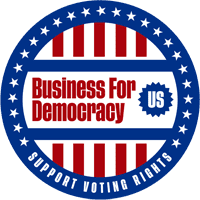Greater Madison IN Business
October 13, 2022
Business for Democracy forms ahead of the mid-term election
Full Video of Press Conference
Joe Vanden Plas, Editorial Director
A group of Wisconsin business executives are forming a new state collaborative called Wisconsin Business for Democracy, which is calling on Congress to pass three pieces of legislation that will protect businesses from what they believe is an effort to establish one-party rule.
The formation of the organization, comprised of business organizations and individual businesses, was announced at a press conference today. Organizers say they are raising the alarm about losing democracy and contend that some state legislatures have or want to allow state and national officials to ignore the will of the people and establish a one-party rule. They charge that the Trump administration and current members of Congress intentionally misused the law on presidential electors vote counting to attempt to deny the public’s will during violent protests on Jan. 6, 2021, a scenario that would have harmed small businesses.
During the press conference, business owners and political candidates noted that the business community relies on free and fair elections, which they believe are threatened. “Small business owners understand that a strong democracy is essential for a vibrant, entrepreneurial economy where small businesses flourish,” said Dan Guerra, CEO of Madison-based Altus, a maker of medical e-learning software. “The two go hand in hand.”
Call to action
Thus far, eight states, including Wisconsin, have built Business for Democracy collaboratives that want to use the voice of small business to pass voting reforms that have languished in Congress. While the organization does not endorse candidates, it does advocate for the passage of the following bills:
Electoral Count Reform Act of 2022: In the view of Business for Democracy, the 1887 law governing congressional procedures for how state electoral votes for president and vice president are cast and counted should be reformed to update its vague and outdated language. The act’s detractors, which include segments of the conservative press, say it must be reformed by Congress to confront the potential for electoral subversion at both the state and federal levels and ensure that partisan politicians cannot substitute their own preferences for the judgment of the American people in presidential elections. The bipartisan bill has 11 Republican and 10 Democrat co-sponsors and is supported by Senate Minority Leader Mitch McConnell, a Republican from Kentucky.
The John Lewis Voting Rights Advancement Act: Proponents say this bill, named for the late civil rights icon and long-time congressman from Georgia, would modernize and revitalize the Voting Rights Act of 1965, strengthen legal protections against discriminatory voting policies and practices, and guarantee equal access to the ballot.
The Freedom to Vote Act: Backers say this legislation would improve access to the ballot, advance election integrity reforms, and protect the country from emerging threats. The bill also seeks to end partisan gerrymandering and root out what its sponsors call the undue influence of special interest money in politics.
The press conference also was attended by Camille Carter, president and CEO of the Madison Black Chamber of Commerce; Mathias Lemos Castillo, secretary of the Latino Professional Association; and Mike Van Someren, D-Pewaukee, who is challenging incumbent Republican Scott Fitzgerald to represent Wisconsin’s fifth congressional district in the House of Representatives.
Carter said that the ability of voters to command the attention of politicians is especially important to racial minorities and minority-owned businesses because entrepreneurship is the key to economic success for minorities and lifting underserved communities. “All of us benefit from a state and nation that give equal opportunity to all to pursue their dreams of becoming an entrepreneur and open a small business,” Carter noted. “This is possible because of our strong democracy that allows us to pick our leaders, who listen to all voices in making policy.”
Castillo echoes those sentiments, adding that because the voices of small business operators are heard today by those seeking public office, entrepreneurs have confidence in the government. That dynamic has resulted in an entrepreneurial economy that is the envy of the world but is threatened by those who “want to tear down our democracy and replace it with an autocracy,” he charged.
“Growing a local economy from the ground up by entrepreneurs of color willing to work hard, invest, and sacrifice benefits not only their families but all Americans,” Castillo stated. “For this grassroots economic development to work, these minority entrepreneurs must have access to capital, have the opportunity for private sector and government contracts, and have confidence that their elected officials will support policies for all small businesses to be successful, especially those in underserved communities.”
Surveying the political landscape
Business for Democracy, a campaign of the American Sustainable Business Network, invited Wisconsin congressional candidates to complete a short survey on the aforementioned legislation. Four candidates, including Van Someren, indicated they would support each of the electoral reform bills; the others are Lt. Gov. Mandela Barnes, who is challenging U.S. Senator Ron Johnson this fall, plus House candidates Brad Pfaff, who is running in the third congressional district, and Dick Ausman, who is challenging incumbent Republican Tom Tiffany in the seventh congressional district.
Van Someren told the gathering that both democracy and the economy are on the ballot and put the choice voters face in stark terms. “This November, voters will have a choice,” he noted. “They can choose candidates who support democracy or those who want to deny the will of the voters. They can choose our vibrant, entrepreneurial economy, or head us down the road to a Russian-style economy that favors big corporations, not small businesses.”
https://www.ibmadison.com/business-for-democracy-forms-ahead-of-the-mid-term-election/
